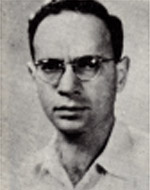Droshkovsky, Ilan
Son of Dr. Stanislaw and Christina, was born on January 8, 1928 in Krakow (Poland), the father was one of the greatest lawyers and the mother was a doctor, he studied at the school in Krakow and later in Karolawska-Huta, In Upper Silesia, where his parents lived until 1939. During the Nazi occupation, Ilan and his parents found a hiding place in the homes of friends, and spent some time in a convent in a Catholic boys’ school. He completed all his studies, passed the matriculation exams, and even completed his first year at the medical school of the University of Cracow, where he left for training in Bilbe. In 1949, he immigrated to Israel with a “Besht” group and went to Kibbutz Amir training, where he devoted himself to working in the fields of the garden and the organic garbage. During his travels around the Upper Galilee, he was interested in various plants, especially the wild vegetation in the area, where he met the Arabs for the first time, began to learn their language and customs and was a central member of both internal and external affairs. He joined the Kibbutz Revadim and joined the IDF in May 1951. On his return from military service, he was appointed to the role of the treasurer, which he did in a thorough manner, and then went to Jerusalem to study agricultural sciences. He did not want to be supported by the kibbutz and claimed that the country and the kibbutz needed trained farmers, and therefore he did not continue his medical studies, but he did not abandon his political activities as a member of the student union conference. During his training he stood out for his strength and suffering and his loyalty to his duties and his self-sacrifice on the fifth of Tishrei XVII (09/10/1956) fell among Bedouin environments. He was brought to eternal rest in a stratified agriculture. Words about him and fragments of his letters are presented in a booklet that was published in memory of those who were killed in the battle of Dweima by their training comrades. On the first anniversary of his death, Kibbutz Revadim published a booklet bearing the name “Ilan”, which includes things about him and his memory.
